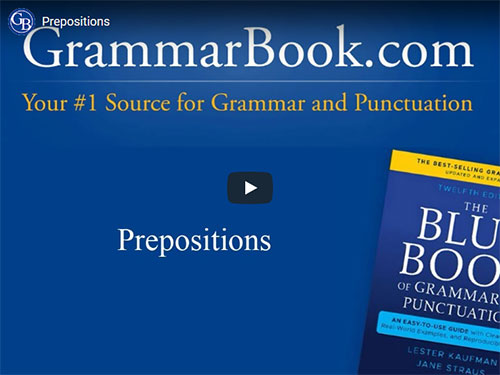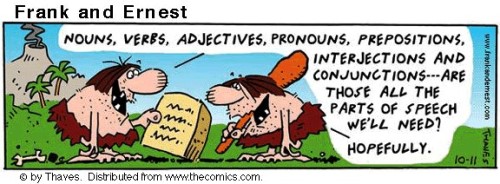|
Can the Versatile Adverb Modify a Noun?
|
|
Writers know that an adverb modifies a verb, an adjective, or another adverb. They likewise understand it can enhance an infinitive, a gerund, a participle, a phrase, a clause, a preposition, or the rest of the sentence in which it appears.
The question that remains is whether the agile adverb can modify a noun or a pronoun as well. Some observers say yes; others disagree.
Those in the "yea" will cite usage such as almost everybody went to the party and hardly anyone took the test as proving an adverb can augment a noun or a pronoun.
Those in the "nay" will point out that, by definition, a word that modifies a noun or a pronoun is an adjective; therefore, if an adverb is describing a noun or a pronoun, it qualifies as an adjective and needs to be categorized as such.
The Yeas will then counter with two points. First, they will refer to a sentence such as even these numbers are wrong sometimes. In this context, even is an adverbial modifier of the phrase these numbers.
Compare that usage with these even numbers are wrong sometimes. In this context, even is an adjectival modifier of numbers.
Second, the Yeas will refer to usage in which an adverb follows a noun to describe it, as in the opportunities here are endless. The word here, an adverb, modifies the preceding opportunities. Similar usage appears in let's discuss this in the room upstairs.
The Yeas might add to their counterpoints with a sentence such as where are my keys? A purist beholden to definition might argue that where as an adverb modifies the verb, are. In turn, the Yea team could argue that where adverbially modifies the subject keys after the linking verb to be.
Further clouding the issue is that dictionaries vary in their classifications of certain words. For example, ninjawords.com and dictionary.com categorize ahead as an adverb only; merriam-webster.com includes it as both an adverb and an adjective. How then would we label it in the phrase the road ahead?
For the word forward, both dictionary.com and merriam-webster.com seemingly treat it as an adjective when it precedes a noun and an adverb when it follows one. Ninjawords.com likewise identifies forward as both an adverb and an adjective, although its stance on whether it can be an adverb for a noun is less clear.
Though leaving room for uncertainty, this possible accord on forward could unite the Yeas and Nays in allowing that the word adverbially describes a noun in a phrase such as from that moment forward. However, here again the Nays see an obvious opening: forward can also be interpreted as an adverb modifying a prepositional phrase.
In sum, the grammatical house remains divided over whether an adverb can modify a noun or a pronoun. Where disparity appears to erode the most is when the adverb follows the noun, as in the opportunities here and the room upstairs. Here we may someday see usage and classification become common enough to achieve consensus.
Until then, we'll continue to watch and wait for when, where, and how majorities may or may not form on this issue as American English further evolves.
|
View and comment on this
article on our website.
|
|
|

|
Pop Quiz
Applying the discussion and possible logic in this article, identify whether the emphasized word in the following sentences is an adverb or an adjective.
1. Oddly, the committee voted for the proposition even though it could lose money for the association.
a) adverb
b) adjective
2. You'll find the box in the closet downstairs.
a) adverb
b) adjective
3) Most kids like to watch cartoons.
a) adverb
b) adjective
4) I want the truth straight. Tell me everything.
a) adverb
b) adjective
5) Do you see the fork in the road ahead?
a) adverb
b) adjective
|
 |
The Blue Book of Grammar and Punctuation
by Lester Kaufman and Jane Straus |
The Authority on English Grammar! Twelfth Edition Now Available
An indispensable tool for busy professionals, teachers, students, homeschool families, editors, writers, and proofreaders.
Available in print AND as an e-Book! Over 2,000 copies are purchased every month!
To order the book, simply click the link to order the book from the GrammarBook.com website.
|
Free BONUS Quiz for You!
[[firstname]], because you are a subscriber to the newsletter, you get access to one of the Subscribers-Only Quizzes. Click here to take a Confusing Words and Homonyms Quiz and get your scores and explanations instantly!
We will be adding many more quizzes this year to our already substantial list of them. If you have suggestions for topics we have not yet covered, please send us a message at help@grammarbook.com.
|
Hundreds of Additional Quizzes
at Your Fingertips
Subscribe now to receive hundreds of additional English usage quizzes not found anywhere else!
Teachers and Employers
Save hours of valuable time! You may assign quizzes to your students and employees and have their scores tallied, organized, and reported to you! Let GrammarBook.com take the hassle out of teaching English!
"Fun to test my skills."
"The explanations really help ... thanks!"
"I can select the quizzes to assign to my students, and then the results are reported to me automatically!"
If you think you have found an error in a quiz, please email us at help@grammarbook.com
|
Wordplay

Pop Quiz Answers
1. Oddly, the committee voted for the proposition even though it could lose money for the association.
a) adverb ["Oddly" modifies both the verb voted and the full sentence in which the adverb appears]
b) adjective
2. You'll find the box in the closet downstairs.
a) adverb ["downstairs" here is used more to modify the closet's location than the sentence's verb, find]
b) adjective
3) Most kids like to watch cartoons.
a) adverb
b) adjective [while appearing to be a word that some might interpret as an adverb or an adjective, most in this context modifies the subject kids as an adjective meaning "greatest in size, extent, or quantity."]
4) I want the truth straight. Tell me everything.
a) adverb
b) adjective ["straight" modifies truth in the context of "frank, candid"; the standard noun phrase would be straight truth; in this quiz question the adjective is emphasized by appearing after the noun]
5) Do you see the fork in the road ahead?
a) adverb ["ahead" here is used more to modify the fork's (and the road's) location than the sentence's verb, see]
b) adjective
|
 |
English in a Snap:
68 One-Minute English Usage Videos FREE |
Learn all about who and whom, affect and effect, subjects and verbs, adjectives and adverbs, commas, semicolons, quotation marks, and much more by just sitting back and enjoying these easy-to-follow lessons. Share them with your colleagues (and boss), children, teachers, and friends as well! Click here to watch.
|
|





